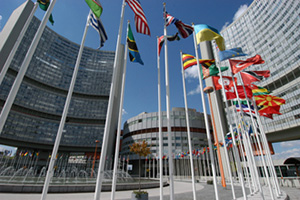
Its that time of year again, when the top nuclear dogs convene in Vienna for the annual IAEA General Conference. Not too much pomp, lots of circumstance. “Side” meetings galore. And, as always, the U.S. and its allies “mean girl” Iran and other evil-doers by not inviting their delegations to the good stuff. The list of documents made available by the IAEA can be found here.
The GC is queued up by the Board of Governors, which meets the week prior. Mark Hibbs, who I actually met for the first time at one of these confabs, dutifully reports from Vienna on what went on there. He also provides a terrific analysis of what Amano might might do vis a vis Iran using reporting rules spelled out in GOV/INF/500/Rev.1. And Miles Pomper and Elena Sokova at the Monterey Center for Nonproliferation Studies (CNS) provide some excellent background on the issues in the run up to the big meet.
As has been the case in a number of previous GCs, the other political hot potato agenda issues will be Israeli nuclear capabilities and implementation (or lack thereof) of safeguards in the DPRK. The Israeli program is generally inserted by the Arab states, and this year was no exception. Final debate on these items tend to get saved for the end and often bring these sessions deep into the night of the last hours of the GC. They are an endurance test for delegations, members of which show up at the various cocktail parties and local bars in the wee hours to scoop up the last of the canapes and have ein bier or three before jumping on the U-Bahn to head for home/hotel.
The opening statements of the heads of the GC delegations are an opportunity to pontificate, and often, to sling arrows at other member states. The U.S. and Iran have already gotten into it by trading barbs regarding the Iranian nuclear program in their opening statements (I, for one, LOVE the idea of mild-mannered Nobel Physicist Steven Chu getting all up in Iran’s Kool Aid for misbehaving. Wish I could have been there. For the uninitiated, the Secretary of Energy heads the U.S. delegation to the GC and presents the U.S. remarks.) And Fereidoun Abbasi Davani, Iran’s Vice President and Head of Atomic Energy Organization, was equally saucy, blaming the U.S. and its allies as the reason Iran will be moving its nuclear activities underground at Fordow. I’m going to go out on a limb here and say that maybe they’re just hiding something?
Egyptian Minister of Electricity and Energy Hassan Ahmad Younis has already begun the Israel-bashing in his country’s opening statement yesterday, stating that “Israel’s rejection of the calls for applying the comprehensive safeguards of the International Atomic Energy Agency (IAEA) to all its nuclear facilities risks undermining the credibility of the IAEA.” Hm, wonder what Iran, North Korea and Syria have done on that count?
New this year will be a significant emphasis on nuclear safety in light of the events that occurred at the Fukushima nuclear power plant in Japan. Director General Amano’s remarks on the subject can be found here.
Japanese Fukushima Nuclear Disaster Minister (who would want THAT job?) Goshi Hosono held a press conference at the Austria Center on Monday, emphasizing that the reactors at the plant were stable and that they government was preparing for cold shutdown of the units by the end of the year, slightly ahead of schedule. Before his speech, he met with IAEA DG Amano, during which time he asked that the IAEA dispatch a team to help. Hosono told reporters, “We need advice on technology to remove cesium from the accumulated radioactive waste.” Ya think?
Hosono added that a new nuclear regulatory agency would be established by around next April as an affiliated agency of the Environment Ministry and that a study mission from the IAEA would visit Japan next year to assess the new agency’s work.
Prime Minister Yoshihiko Noda is expected to address the U.N. General Assembly on Sept. 23 to discuss the status of Fukushima-related goings on.